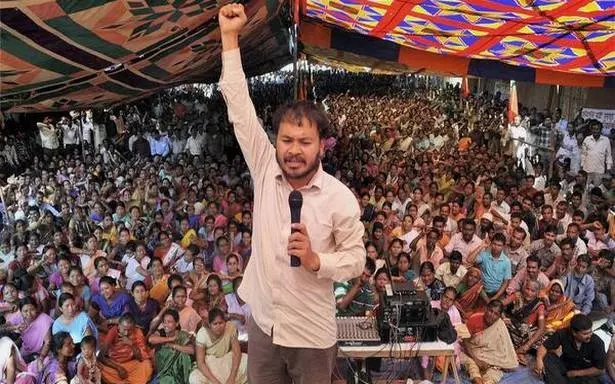
Spl NIA Court reopens Anti-CAA case against MLA Akhil Gogoi
text_fieldsFile photo of Akhil Gogoi at a rally
Guwahati: An anti-CAA case against Assam MLA Akhil Gogoi and his three accomplices was reopened by the Special NIA Court on Thursday as a result of a Gauhati High Court order.
The Supreme Court's ruling granting protection from arrest in connection with the case relating to the anti-Citizenship (Amendment) Act stir and possible Maoist ties was presented by Gogoi's attorney on the first day.
Considering the apex court ruling, Special NIA Judge Pranjal Das deferred the hearing and listed the case on February 28.
Hundreds of Gogoi’s supporters waited outside the court premises to express solidarity with the Raijor Dal chief.
On February 9, the Gauhati High Court had allowed the National Investigation Agency (NIA) to frame charges against Gogoi and three others in the case. Its order had come on an appeal of the NIA challenging the order of the Special NIA Court giving clean chit to the four.
The other three accused were Dhaijya Konwar, Bittu Sonowal and Manash Konwar, all of whom had got bail in the NIA case and were released from jail.
Gogoi was the only one whose bail was rejected by the court and he was released after spending 567 days in jail once the Special NIA Judge Pranjal Das had cleared him along with the three others of all charges.
The NIA was investigating two cases of Gogoi related to anti-CAA violence. In one of those, the Special NIA Court granted him bail, which was upheld by the Gauhati High Court too in April 2021 after the probe agency challenged it.
The RTI activist-cum-peasant leader continued to be in judicial custody as his bail was rejected in the second case related to anti-CAA violence and was being investigated by the NIA.
Later, the Special NIA Court on July 1, 2021, released Gogoi and his three associates for their alleged role in the violent anti-Citizenship (Amendment) Act stir in the state in December 2019 and observed there was nothing to indicate “talk of blockade” threatened the country’s economic security or was “a terrorist act.” The NIA then moved the Gauhati High Court appealing to allow the agency to frame charges under various sections, including sedition, of the IPC and the Unlawful Activities (Prevention) Act, 1967.
In a strongly worded judgement, the Special NIA Court had said that in the interests of justice, it found the conduct and approach of the investigating authority in the case to be “discouraging”, to say the least.
“The court has high expectations from a premier investigating agency like the NIA, entrusted with the profoundly important task of protecting our country and us, citizens from the menace of terrorism.
“The court hopes and expects that, such high standards will be upheld, for sake of the country and this one will be just an exception,” the Special NIA Judge Pranjal Das had said in his order.
Gogoi, who contested as an Independent from Sibsagar in 2021, became the first Assamese to win an election remaining behind the bars without any physical campaigning.
He also became the first in Assam Assembly to take oath on May 21, 2021, as a prisoner MLA, coming from jail on special permission from the court.
With PTI inputs






















